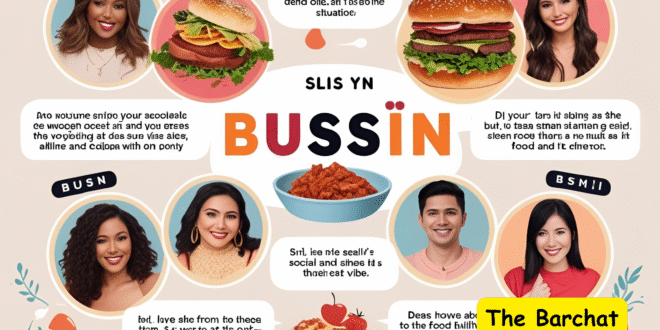Bussin Meaning In today’s fast-changing digital world, slang plays a big role in how younger generations express themselves.
Among the many popular slang terms trending online, “bussin” stands out due to its unique energy and cultural roots.
While the word may sound strange at first, especially to older generations, it’s now a staple in Gen Z vocabulary — often used to describe something extremely good, especially food.
But where did it come from? What does it truly mean? How do people use it correctly?
This article will explore all aspects of the “bussin meaning”, from its real definition and origins to examples of its use and comparisons with other slang terms.
Whether you’re a parent trying to understand your kids, a marketer keeping up with youth lingo, or just curious about modern-day language, this guide has everything you need.
What Is the Real Bussin Meaning in Slang?
 The bussin meaning in slang generally refers to something that is exceptionally good, tasty, or pleasing.
The bussin meaning in slang generally refers to something that is exceptionally good, tasty, or pleasing.
When someone says, “This food is bussin,” they are complimenting the taste in a big way — it’s not just good, it’s amazing.
The term goes beyond food too.
It can also be used to describe anything that’s top-tier, whether that’s an outfit, a car, or even an experience.
However, “bussin” didn’t emerge overnight. It stems from African American Vernacular English (AAVE), where it was initially used to describe something that was really “poppin” or “going off.”
Over time, especially with the help of social media platforms like TikTok, it became more mainstream.
It’s important to note that slang often carries cultural weight.
Using “bussin” in the wrong context can make you sound inauthentic or even disrespectful.
That’s why understanding its real meaning and origins is essential before adopting it into your vocabulary.
Overall, “bussin” is a fun and expressive way to show excitement or approval — just make sure you’re using it the right way.
Bussin Meaning Explained with Real-Life Examples
To truly understand the bussin meaning, it helps to look at how it’s used in real life.
Imagine you’re eating a delicious burger at a new restaurant.
You take a bite and say, “Yo, this burger is bussin!” That simple expression says a lot — it’s more than just tasty, it’s next-level good.
That’s how Gen Z uses the term daily.
Another scenario could be someone trying on a new outfit.
If their friend says, “That fit is bussin,” it’s a major compliment.
It means the outfit looks amazing, stylish, and makes a strong impression.
The word captures that wow factor without the need for a long explanation.
TikTok videos have helped solidify the meaning with funny and exaggerated skits.
For instance, creators might film themselves reacting dramatically to a meal, followed by the punchline, “It’s bussin, no cap!” These moments add personality and emotion to the term.
The key takeaway is that “bussin” emphasizes something exceptionally good. It’s not used for average things.
Whether it’s food, fashion, music, or moments, the term gives extra weight to your excitement and approval.
Knowing how it’s used in the real world helps avoid awkward misuse and builds credibility in digital conversations.
The Viral Origin of Bussin Meaning on TikTok
The bussin meaning gained mainstream fame largely thanks to TikTok.
While the term has deeper cultural roots, its explosion in popularity happened online.
In early 2021, videos of influencers and everyday users describing meals as “bussin” began to flood the platform.
Often, these clips were humorous, featuring over-the-top food reviews or exaggerated reactions.
One of the most notable trends included TikTokers asking, “Is it bussin, Janelle?” before diving into a meal.
The repetition and humor made the phrase unforgettable and relatable.
Memes and challenges followed, solidifying “bussin” as part of TikTok’s vocabulary.
The platform’s algorithm played a major role too.
As more creators used the term, TikTok promoted related content to a wider audience, making “bussin” a viral slang term within weeks.
It crossed digital boundaries, making its way into tweets, Instagram captions, and even casual conversations.
While TikTok helped push “bussin” into the spotlight, it’s important to respect its origins.
The word wasn’t invented by the app — it was amplified by it.
Understanding that difference helps us appreciate how language evolves through both culture and technology.
How the Bussin Meaning Changed Over Time
Language is fluid, and the bussin meaning has seen some interesting shifts over time.
Originally rooted in African American Vernacular English (AAVE), “bussin” was a way to describe something bursting with energy or flavor.
It had a slightly different connotation — more raw, more expressive — and was often used within community circles.
As the word entered mainstream use, especially via TikTok and other social media platforms, its meaning became more focused and polished.
Today, it’s mostly used to describe delicious food, though it can also apply to anything exciting or high quality.
This narrowing of use is common when slang crosses over into general vocabulary.
Interestingly, some people now use “bussin” ironically or humorously.
For example, someone might jokingly call a plain sandwich “bussin” to make fun of exaggerated online reviews.
This sarcastic twist adds another layer to the word’s evolution.
Despite its changing context, the core meaning has remained fairly consistent — it still signals approval, excitement, or satisfaction.
This adaptability is part of what makes slang like “bussin” so powerful.
It grows with the culture and adapts to how people choose to express themselves.
Bussin Meaning in Food Reviews and Social Media
When it comes to food reviews and digital culture, the bussin meaning has become a go-to term for online expression.
You’ll often see food bloggers, influencers, and casual TikTokers taking a bite of a dish and immediately declaring it “bussin.”
This one word can summarize an entire culinary experience.
Food content thrives on exaggeration and emotional reaction.
“Bussin” fits perfectly into that mold. It’s short, punchy, and full of enthusiasm. It doesn’t just say the food is good — it says the food is unforgettable.
Fast food chains and trendy restaurants have even started using it in their promotions to appeal to younger audiences.
Whether it’s used seriously or as part of a meme, “bussin” in food reviews adds flair and relatability.
It shows how language, especially slang, can enhance digital content and make it feel more authentic and engaging.
Common Misinterpretations of Bussin Meaning
Despite its popularity, the bussin meaning is often misunderstood or misused — especially by people outside the culture or older generations.
One common mistake is thinking “bussin” means something bad or negative.
This is likely due to its unfamiliar sound or confusing context. In reality, “bussin” is always a compliment.
Another misinterpretation is assuming it’s only used for food.
While that is the most common application, especially online, “bussin” can also describe anything that’s impressive or enjoyable.
Saying someone’s outfit or playlist is “bussin” is totally valid — as long as it’s genuinely good.
Some people also misuse the word by forcing it into conversations where it doesn’t naturally fit. This often happens in advertising or media trying too hard to sound “trendy.”
Using the term out of context can come across as cringey or inauthentic, especially to younger audiences who value genuine expression.
To avoid misinterpretation, it’s helpful to observe how the word is used organically on platforms like TikTok or Twitter.
This gives a clearer picture of its tone, usage, and limitations.
Slang is dynamic, and understanding its nuances is key to using it respectfully and effectively.
Why Gen Z LovesUsing the Bussin Meaning
The bussin meaning resonates deeply with Gen Z, and there are a few reasons why this slang term has gained such traction among them.
First, it’s expressive. One word captures excitement, approval, and energy — everything Gen Z looks for in communication.
In a world of short-form content and quick conversations, “bussin” gets the point across fast.
Second, it carries cultural weight.
Gen Z tends to be more aware and appreciative of cultural roots, especially those tied to African American language and expression.
Using a term like “bussin” allows them to feel connected to a broader cultural narrative while also staying on trend.
Third, the word is fun to say. It has a satisfying rhythm and stands out in conversations.
Paired with emojis or expressive videos, it becomes a meme-worthy term that enhances online engagement.
Lastly, it’s part of a larger movement of reclaiming and remixing language.
Gen Z enjoys putting their own spin on communication, and “bussin” fits that model perfectly.
It’s bold, creative, and current — everything this generation embraces in their digital language.
Bussin Meaning vs. Other Popular Slang Terms
When comparing the bussin meaning with other slang terms, it becomes clear that each word has its own unique vibe.
“Bussin” specifically emphasizes taste and quality, especially when it comes to food.
On the other hand, words like “lit,” “fire,” or “slaps” often describe music, events, or general excitement.
For example, if someone says, “That concert was lit,” they’re talking about high energy and fun.
If they say, “This track slaps,” it means the song hits hard — it’s catchy and impressive.
But if someone says, “This chicken sandwich is bussin,” they’re highlighting how incredibly good it tastes.
“Bussin” has also developed a certain meme status that some of the other words don’t carry.
It’s become part of online culture in a very visual and performative way, especially through TikTok skits and exaggerated reactions.
Understanding these differences helps people use the right term in the right context.
Using “bussin” when describing a playlist might feel off unless it’s being used humorously.
Slang words are tools of expression, and knowing their specific meanings makes communication smoother, funnier, and more effective.
How to Use the Bussin Meaning Correctly in Sentences
Learning how to use the bussin meaning correctly can help you sound natural and up-to-date in conversations.
The most common sentence structures include phrases like:
- “This pizza is bussin!”
- “That new burger joint? Straight bussin.”
- “Your outfit is bussin today, no cap.”
As you can see, the term is often used as an adjective, placed after the verb “is” or used on its own for dramatic effect.
In casual speech, it’s totally fine to use short, emphatic statements like “It’s bussin!” to express approval.
One thing to be mindful of is the tone and setting.
You wouldn’t typically use “bussin” in professional or formal environments.
It’s very informal, best suited for conversations among friends or on social media.
Also, make sure you’re using it to describe something genuinely good.
Using “bussin” sarcastically can be funny, but only if your tone and context make that clear.
Otherwise, you risk confusing your audience.
Practicing with examples and observing native usage — especially among younger social media users — will help you master this slang and use it with confidence.
A Deep Dive into the Cultural Roots of Bussin Meaning

The bussin meaning carries significant cultural roots, particularly from African American Vernacular English (AAVE).
Before becoming a TikTok trend or Instagram caption, “bussin” was used in Black communities to describe something that was popping, exciting, or full of flavor.
It was a term of expression — rich, energetic, and tied to identity.
As often happens with Black-originated slang, the term moved into mainstream culture through music, comedy, and eventually social media.
Artists, influencers, and everyday users picked it up, sometimes without understanding its deeper background.
This cultural migration raises important questions about appropriation vs appreciation.
While language naturally spreads, it’s crucial to recognize and credit its roots.
The over-commercialization of slang without context can strip it of its original meaning and impact.
Acknowledging where “bussin” came from adds authenticity to its use.
It reminds us that slang is more than just a trend — it’s a reflection of culture, history, and community.
As you use or enjoy the term, keep in mind the people and experiences that gave it life. That’s how we honor language and keep it meaningful.
Conclusion
The bussin meaning is more than just a slang term — it’s a cultural phenomenon.
From its roots in AAVE to its explosion on TikTok and Instagram, “bussin” has become a powerful way to express excitement, especially about food and style.
Whether you’re diving into social media trends, trying to understand youth culture, or just want to expand your vocabulary, knowing how and when to use “bussin” can keep you connected and relevant.
Like all slang, it’s important to understand not just the word but the context and culture behind it.
Used correctly, it adds flair and authenticity to everyday speech.
So next time you bite into something amazing, go ahead and say it — “This is straight bussin!”




